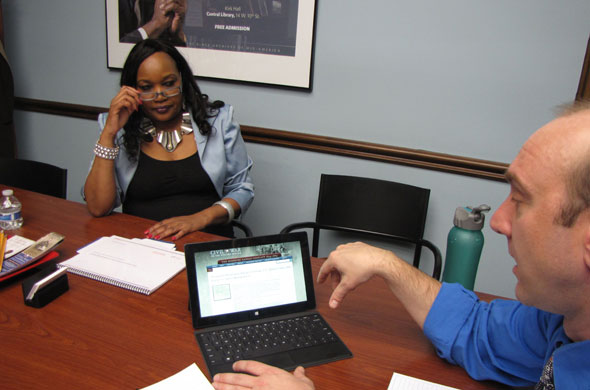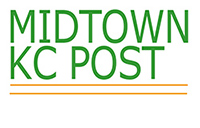
Cheptoo Kositany-Buckner, deputy library director, and David LaCrone, a digital manager, say they hope to use free Google internet service to tackle the digital divide.
As Google fiber trucks work Midtown, the Kansas City Public Library is working on how to best use the free Google its libraries will get this fall.
One big concern is the digital divide, and the library system is a veteran in fighting that.
A recent study found that 17 percent of Kansas City residents don’t use the Internet at all and 25 percent do not have broadband at home.
In a city that will have the nation’s fastest Internet, they are not connected. The main reasons they gave were a lack of relevance and a lack of access.
Cheptoo Kositany-Buckner, deputy library director, and David LaCrone, a digital manager, spoke with a reporter about a problem they have fought for years.
“Even though we’ve been bridging the digital divide,” Kositany-Buckner said, “we want to scale it up.”
They are applying for a grant from the $1 million Kansas City Digital Inclusion Fund as part of a plan to entice teens to the Internet.
The grant would pay for digital media labs at libraries and some other areas and maybe a mobile media lab that could be moved.
Based on a successful library pilot program at Union Station this summer, the labs would be places where teens could access technology and get instruction on how to use it.
It’s hanging out, it’s playing but it’s more, Kositany-Buckner said.
“They come to hang out, and someone tells them, you might like to do coding if you really like games, you might want to do some apps.”
The teens could become a bridge to introduce the Internet to their siblings, parents and grandparents, a bridge that could reach immigrants and lower-income people who need Internet skills to find jobs, she said.
Given access, people will use the Internet, she said. The 2010 renovation of the Lucile H. Bluford branch at 3050 Prospect proved that.
They went from 27 computers there to 87, she said, and all 87 stay in use.
LaCrone said that is a common pattern with urban core libraries. The more computers you put in, the more demand.
They have other big plans for the arrival of Google, but no money for them yet.
They would like to put broadband and computers throughout the city in places like nursing homes, community centers and more.
They would like to create a repository of software that they could rent out to people for two hours or so at a time.
Imagine how much use that would get at tax filing time, LaCrone said, and how much it could help small businesses and individuals with personal finance matters.
The library will work with Google, city officials and others to get people access to an essential tool of modern life, Kositany-Buckner said. They will not play the lead role, but they will be in the middle of it.
“We do it better because we’re free, we’re stable and we’re going to be here for 100 years,” she said.



Who’s talking